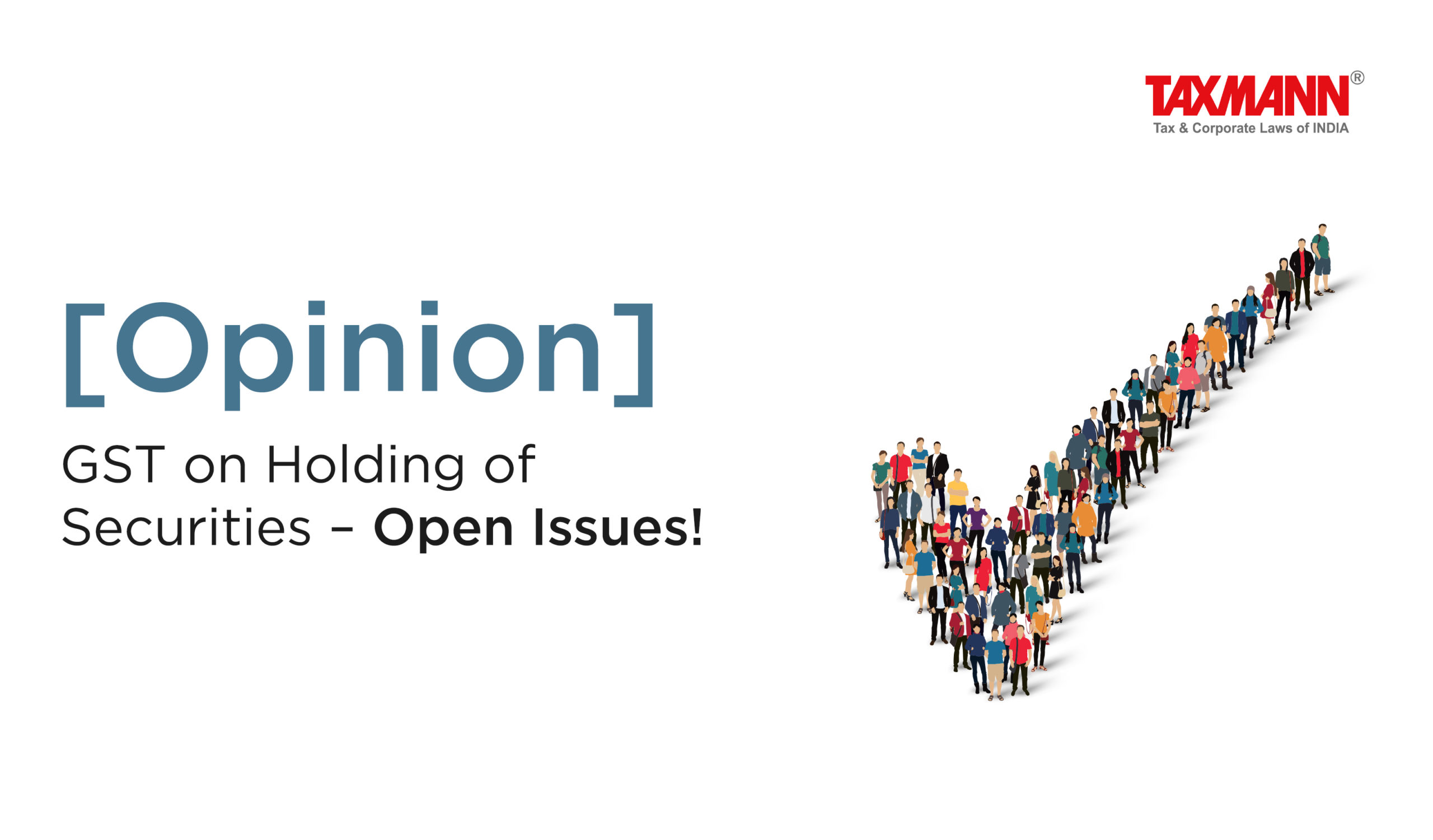[Opinion] GST on Holding of Securities – Open Issues!
- Blog|News|GST & Customs|
- 2 Min Read
- By Taxmann
- |
- Last Updated on 21 July, 2023

Brijesh Kothary & Saundarya Sinha – [2023] 152 taxmann.com 459 (Article)
In the recent 50th GST Council meeting, clarification on various legal ambiguities and issues relating to GST laws were recommended with the intent to benefit the taxpayers at large and avoid unwanted litigation. One such recommendation was in respect of GST implications on ‘holding of securities of a subsidiary company by its holding company’, wherein the Council clarified that this cannot be treated as a supply of services and therefore, cannot be taxed. The council also recommended the issuance of a circular subsequently to avoid the ambiguity and any further legal disputes on this issue on the basis of which Circular No. 196/08/2023-GST dated 17.07.2023 has been issued.
At this juncture, it becomes pertinent to revisit the previous understanding regarding the GST implications on such activity and issues arising for taxpayers due to ambiguities, which thereafter necessitated the issuance of such clarification by the Council.
Position under the GST laws
Under the GST laws, the term “services” means anything other than goods, money and securities but includes activities relating to the use of money or its conversion by cash or by any other mode, from one form, currency or denomination to another form, currency, or denomination for which a separate consideration is charged. The Explanation to the above definition clarifies that the expression “services” includes facilitating or arranging transactions in securities. Securities are omitted from the definition, which suggests that they are not regarded as services and are hence exempt from taxation.
Various companies across different industries which have a parent/holding company outside India received notices and demands by the department seeking GST payable under reverse charge by the Indian subsidiary company on the activity, along with interest and penalty for failure to discharge GST liability on the same. While seeking such demands, the Department took the interpretation that the Indian subsidiary company was receiving services which includes activities relating to use of money i.e., investment in stock, management decision making, etc. which is covered under the definition of “Services” as per Section 2(102) of the Central Goods and Services Tax Act, 2017 (“CGST Act”). It was the view of the department that such services are squarely covered by the scope of supply under Section 7(1)(c) read with Entry 5(e) of Schedule II of the CGST Act, since the holding Company oversees the work of the subsidiary Company as per the provisions of Companies Act, 2013. The department sought to classify such services under SAC 997171 seeking GST on the value determined as per Rule 28 of the CGST Rules, 2017 since the Holding and subsidiary company would constitute as related persons as per Explanation provided under Section 15 of the CGST Act. On the basis of the said points, the Department demanded IGST along with interest and penalty from the Company on reverse charge basis as Holding of equity shares of the Company. Similar demands under forward charge were also likely to be issued to domestic companies holding shares in subsidiaries in India.
Click Here To Read The Full Article
Disclaimer: The content/information published on the website is only for general information of the user and shall not be construed as legal advice. While the Taxmann has exercised reasonable efforts to ensure the veracity of information/content published, Taxmann shall be under no liability in any manner whatsoever for incorrect information, if any.

Taxmann Publications has a dedicated in-house Research & Editorial Team. This team consists of a team of Chartered Accountants, Company Secretaries, and Lawyers. This team works under the guidance and supervision of editor-in-chief Mr Rakesh Bhargava.
The Research and Editorial Team is responsible for developing reliable and accurate content for the readers. The team follows the six-sigma approach to achieve the benchmark of zero error in its publications and research platforms. The team ensures that the following publication guidelines are thoroughly followed while developing the content:
- The statutory material is obtained only from the authorized and reliable sources
- All the latest developments in the judicial and legislative fields are covered
- Prepare the analytical write-ups on current, controversial, and important issues to help the readers to understand the concept and its implications
- Every content published by Taxmann is complete, accurate and lucid
- All evidence-based statements are supported with proper reference to Section, Circular No., Notification No. or citations
- The golden rules of grammar, style and consistency are thoroughly followed
- Font and size that’s easy to read and remain consistent across all imprint and digital publications are applied



 CA | CS | CMA
CA | CS | CMA
